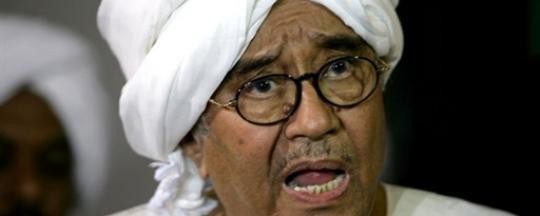Sudan’s opposition and armed opposition have clarified that they are prepared to participate in a national political dialogue, as proposed by President Omar Al Bashir, under the condition that the dialogue be inclusive and lead to “real change.”
This follows their boycott of the national dialogue initiative, which started on Sunday through the convening of a National Political Parties Summit, chaired by Bashir.
President Bashir announced the dialogue initiative in late January calling for a reform plan prepared by the ruling National Congress Party (NCP). He explained the country was entering a new phase following the separation of South Sudan, “so there has to be preparedness for a great leap that essentially leads to national loyalty rather than partisan loyalty.”
The National Consensus Forces (NCF), chaired by Faroug Abu Eisa, and the armed opposition Sudan Revolutionary Front (SRF), issued a joint statement Tuesday calling for an independent mechanism to oversee the political dialogue process.
They stressed the importance of “an independent mechanism to administer a national dialogue between all parties, and to identify the actions and time required for a serious, productive, and responsible dialogue.”
The NCF-SRF statement points the need for political parties to agree on a clear roadmap for “transitional arrangements, including the establishment of a transitional government to implement the decisions reached in the dialogue.”
According to the two coalitions, their proposed transitional government would later convene a a constitutional conference, “in which all political and social forces participate, without exclusion.”
NCF chairman Abu Eisa told the press that the cooperation of SRF and the NCF will continue until they have reached their joint programme “that will benefit all the people of Sudan.”
At the outset of the dialogue meeting on Sunday, the Sudanese president announced a series of presidential resolutions on activities of political parties, press freedom, and the release of political detainees, portraying the move as a relaxation of restrictions.
But one of the NCF spokesmen, Siddig Yusif, dismissed the move as insincere, pointing to the recent arrest of activists and confiscation of the print run of El Midan newspaper.
Yusif noted that after Al Bashir’s announcement, “only five detainees were released: Abdel Aziz El Tom, Mohamed Salah, Abdel Munim Adam El Tom, Ghazi El Rayeh El El Sanhouri, and Salih Ibrahim.”
“Yet a number of activists remain behind bars, including journalist and blogger Tajeldin Arja, besides about 20 people who were arrested during the 2013 September protests by the security forces. Members of the Justice and Equality Movement have been sentenced for political reasons to periods ranging between 5 and 20 years,” he added.
Related:
‘Sudan dialogue is meeting between Islamists’: rebel leader (8 April 2014)
Coalition of 17 parties to boycott Sudan’s ‘national dialogue’ (7 April 2014)
File photo: Farouk Abu-Issa, leader of the NCF




